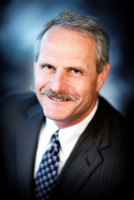
Tim Hilbert, a director at Kreischer Miller who joined the firm in 1983, retired in December 2018 after a long career in public accounting. We asked him to reflect on his time in the profession, the changes he’s seen through the years, and his advice for the next generation.
I have no doubt that I arrived for my first day in public accounting far less well prepared and skilled than most of today’s newest team members. The Financial Accounting Standards Board (FASB) was established in 1973, just one year before my graduation. Before that, most of the highest level authoritative pronouncements were issued by the Accounting Principles Board, an AICPA entity that was replaced by FASB. The first time I sat for the CPA exam in the spring of 1975, I only needed to know the ASB and three FASB pronouncements, as well as some secondary guidance. That is far less than what’s required today.
At the time, the exam was on paper. Tools required and allowed were a #2 pencil, a straight edge, a slide rule for multiplication, and blue books to record answers to essay questions and calculations. I filled in the answers to the multiple choice questions on a separate sheet.
Over the two and a half day endurance test administered in one sitting with about 1,000 other candidates at the Philadelphia Civic Center (a facility long since demolished), I was able to pass two of the four parts of the exam. I completed the other two parts in time to be promoted to senior accountant at my Big 8 firm (now PwC).
My first exposure to computers came in the late 1970s, when I was selected to be part of a pilot group of senior accountants. We were trained on spreadsheet applications on an Apple IIE computer that required all work to be saved on 5.25” floppy disks. The spreadsheet was a single page, 640 columns wide and 640 lines deep. The functionality was extremely rudimentary compared to today’s Excel. There was no such thing as a network or paperless working papers for file repository.
As an auditor at PwC, I was very fortunate to have mentors, partners, and a personnel manager with whom I built strong professional relationships. They did some on the job training and all advocated on my behalf for challenging work opportunities and responsibilities (the work environment was similar to that of Kreischer Miller’s in regards to mentoring, training, and career opportunities). At PwC, industry specialty was coming into play and I became the harness horse track racing audit expert in the Philadelphia office along with assignment to two SEC registered company audits.
I was also fortunate to acquire a wealth of tax knowledge early in my career, thanks to the tax environment at the time. Tax laws in the early 1980s prompted a proliferation of tax shelters, which led to a significant exodus of tax managers to shelter organizations. My industry specialty was oil and gas taxation. PwC encouraged me to run a tax team. Their goal was to train a well-rounded accountant to serve middle market, closely-held businesses.
That experience served me well, as it prepared me for the clients I’d ultimately be working with at Kreischer Miller. So you could say my transition to Kreischer Miller was tailor made. I focused on taxes for my first few years at Kreischer Miller, but eventually returned to a client service role working with professional services entities, while retaining a number of high-net-worth individual tax clients.
An opportunity to challenge myself once again came eight years ago at a time when our Employee Benefit Plan (EBP) audit practice was growing significantly. I had some knowledge of the operation of EBPs and that, combined with a concentrated refresh of rusty audit skills, led me to join Kreischer Miller’s EBP industry group and grow my knowledge in another audit and accounting area.
Since my career began in 1974, I’ve experienced about five changes to my career focus along with a wealth of specialty knowledge and skills development opportunities. I view these as mini careers within one larger career. Each time, I was fortunate to have others with whom I worked that willingly shared knowledge, provided guidance, and encouraged my growth. In some instances I was encouraged by mentors to assume a role, and in other cases, I recognized an opportunity and volunteered for it.
The challenge for each of you is to find what you are interested in, embrace the required learning, and focus your passion. As I said at Kreischer Miller’s annual meeting last December, your level of career success comes down to how willing you are to seize opportunities and how much responsibility you assume in following your passion. Look around and find those people who can provide you guidance and counsel, but make sure you take initiative and are accountable to yourself and your mentors.
Also check out:


